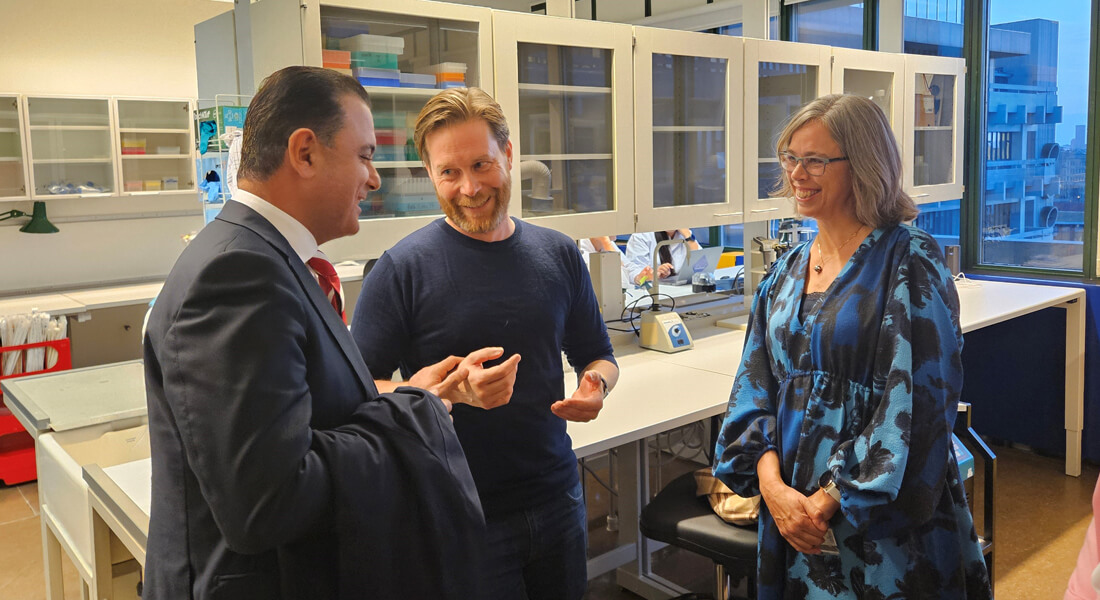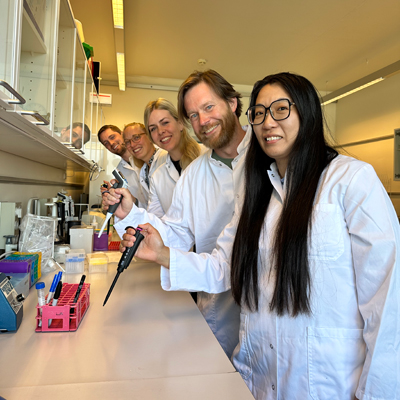Claus welcomes the Latvian Minister of Health
Recently, Desler Group had the honor of receiving a visit from the Latvian Minister of Health, Dr. Hosam Abu Meri. The visit was part of an inspiration tour in Denmark to learn more about our healthcare system.

There were broad smiles all around when the Latvian Minister of Health visited floor 22.5 at Panum a few weeks ago. Along with the Latvian Ambassador to Denmark and the Dean here from SUND, Bente Stallknecht, he visited Associate Professor Claus Desler to learn more about Desler Group and their work on understanding the biological mechanisms associated with aging.
After a warm welcome on floor 22.5, the visit continued with a presentation of the group’s research. “It was really cool to have a visit from the Minister of Health, who is also a doctor himself. He was very enthusiastic and curious about the work we do in Desler Group, where we research aging and the development of age-related diseases,” says Claus Desler. “Like most other Western countries, Latvia is also facing a societal development where the population is aging, and healthcare costs are rising.”
Each new generation is expected to have a longer average lifespan than the previous one, which has been a general trend for over 100 years. Unfortunately, the increased lifespan brings a risk that more people will suffer from age-related diseases such as diabetes, kidney diseases, cardiovascular diseases, and cancer for an increasingly longer part of their lives: “We are working to understand how aging is related to the increased risk of these diseases, and our goal is to understand, delay, and prevent them,” Claus Desler explains.

We have previously written about POINT, the EU-supported HORIZON project coordinated by Desler Group. Researchers know that infectious diseases such as influenza and COVID can cause organ damage, which especially in the elderly can lead to the development of chronic diseases in the same organs. The POINT study uses data from Danish and Estonian patient registers to examine citizens’ health status and look for patterns in the development of diseases in the heart, lungs, and kidneys in relation to the time they were infected with COVID-19. The aim is to uncover the mechanisms at play in this process and to identify relevant biomarkers – such as proteins and antibodies – that can indicate what exactly happens in the body when organ damage occurs.
“There are some incredible perspectives in cracking the code on how these diseases arise. It has the potential to fundamentally change the way we organize the last part of life, as it will give many elderly people a completely different quality of life. Instead of being limited by their disease and perhaps spending a lot of time on hospital visits or bedridden, they can spend time on everything from work to engagement in hobbies and community life, helping to care for grandchildren, etc. It could lead to a completely different form of quality of life to decouple disease from old age – or at least delay the diseases by just a handful of years. There will of course also be a huge socio-economic benefit in this, so it is the epitome of a win-win situation,” says Claus Desler.
The visit also marked the beginning of a potential collaboration between Desler Group and Latvian research institutions. As part of their HORIZON program, the EU has developed the WIDERA program. It helps countries with low participation in the EU’s research programs, such as the newest member states from Eastern Europe, to gain better access to research and innovation. The program is designed to create collaboration and networking, so the countries have better opportunities to participate in international research projects. This is exactly the kind of collaboration that Claus and his Latvian guests discussed during the visit.
“It is generally easy to see the benefits of forming new, structured collaborations with research groups from foreign universities. Looking at countries like Latvia, we might have something in terms of infrastructure and technology that can help lift them. Conversely, it is clear that they are at least as talented researchers as we are, so we can learn a lot from them and their ideas. Both parties generally get much better opportunities to exchange new ideas, methods, and really talented students through the WIDERA program, and more specifically, it will allow my group to apply our knowledge of aging to central issues that are also being worked on at Latvian universities,” concludes Claus Desler.
You can find more information on the Desler Group and their work on their website.
